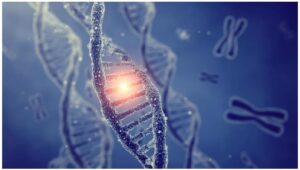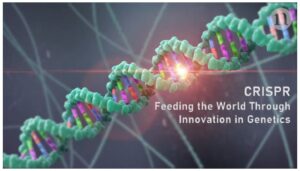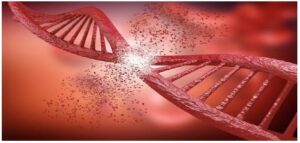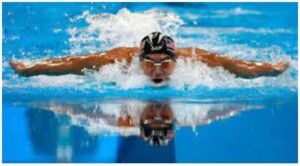THE ROLE OF GENETICS IN PEAK PERFORMANCE

Introduction:
Peak performance has always been a subject of interest among researchers, athletes, and the general public. The question of what makes some individuals perform better than others has led to a lot of research in the field of genetics. This chapter will explore the genetic basis of human performance, discussing the influence of inherited traits on physical, cognitive, and emotional abilities. It will also explore the latest research on gene expression, gene editing, and gene therapy, and how they can be used to enhance performance.
Physical Abilities:
Physical abilities such as strength, endurance, and speed are often considered to be the most important factors in peak performance. These traits are determined by the interplay of genetic and environmental factors. For example, genes that control the production of certain muscle fibers can influence an individual’s strength and endurance. Similarly, genes that affect the metabolism of carbohydrates and fats can influence an individual’s ability to sustain prolonged physical activity.

One of the most famous examples of genetic influence on physical performance is the Jamaican sprinters. Jamaica, a small island nation, has produced a disproportionate number of world-class sprinters. Researchers have found that this is due to a combination of genetic and environmental factors. The Jamaican population has a high frequency of a gene variant that enhances muscle power, which gives them a natural advantage in sprinting.
Cognitive Abilities:
Cognitive abilities such as memory, attention, and problem-solving are also important factors in peak performance. These abilities are influenced by a complex interplay of genetic and environmental factors. For example, genes that control the production of certain neurotransmitters can influence an individual’s cognitive abilities.
The study of identical twins has been one of the most powerful tools for understanding the genetic basis of cognitive abilities. Identical twins have nearly identical genomes, so any differences in their cognitive abilities must be due to environmental factors. Studies have found that cognitive abilities are highly heritable, with up to 80% of the variation being due to genetic factors.

Emotional Abilities:
Emotional abilities such as motivation, resilience, and stress management are also important factors in peak performance. These abilities are influenced by a complex interplay of genetic and environmental factors. For example, genes that control the production of certain hormones can influence an individual’s emotional responses to stress.
One of the most famous examples of genetic influence on emotional abilities is the warrior gene. This gene, also known as MAOA, has been linked to aggressive behavior in some individuals. However, research has also shown that this gene can have positive effects, such as increasing resilience and reducing the risk of depression.
Gene Expression:
Gene expression is the process by which genes are turned on or off. It is influenced by a complex interplay of genetic and environmental factors. For example, genes that control the production of certain enzymes can be turned on or off by environmental factors such as diet and exercise.
The study of epigenetics has been one of the most exciting developments in the field of genetics. Epigenetics refers to changes in gene expression that are not due to changes in the DNA sequence. These changes can be influenced by environmental factors such as diet, stress, and exercise.

Gene Editing and Gene Therapy:
Gene editing and gene therapy are emerging technologies that have the potential to enhance performance. Gene editing involves making precise changes to the DNA sequence, while gene therapy involves introducing new genes into the body to replace or supplement faulty genes.
One of the most promising applications of gene therapy is the treatment of genetic disorders such as muscular dystrophy. Researchers have also explored the use of gene therapy to enhance physical performance, such as increasing muscle mass or improving endurance.
For example, in recent years, researchers have been exploring the use of gene therapy to enhance muscle growth and strength in individuals with muscular dystrophy. By introducing a functional copy of the gene that is mutated in individuals with muscular dystrophy, researchers have been able to increase muscle strength and function in animal models.
While the potential benefits of genetic enhancement are significant, there are also ethical and social considerations that must be taken into account. One concern is the potential for genetic enhancement to exacerbate existing social inequalities. If only a select group of individuals have access to genetic enhancement technologies, it could lead to further disparities in society.
Additionally, there are concerns about the unintended consequences of genetic enhancement. For example, if a gene therapy designed to enhance athletic performance were to have unintended effects on other aspects of an individual’s health, such as increasing the risk of heart disease, it could have serious negative consequences.
While genetics can play a significant role in an individual’s abilities and potential for peak performance, it is important to approach the topic with caution and careful consideration of ethical and social implications. By continuing to study the role of genetics in performance and developing responsible guidelines for its use, we can unlock the full potential of human abilities while minimizing potential harm.
BIOHACKING OF INHERITED TRAITS TO ENHANCE HUMAN PERFORMANCE
Biohacking is the practice of using technology and science to optimize and enhance the human body beyond its natural capabilities. With the advancement of technology and the increasing understanding of the human genome, there is now the possibility of biohacking inherited traits to enhance human performance.

One way inherited traits can be hacked is through the use of gene editing technologies such as CRISPR. CRISPR is a revolutionary gene editing tool that allows scientists to precisely edit specific genes in the genome. By editing genes related to physical, cognitive, and emotional abilities, researchers can potentially enhance an individual’s natural abilities.
For example, researchers have used CRISPR to edit genes associated with muscle growth in mice, resulting in increased muscle mass and strength. Additionally, researchers have used CRISPR to modify genes associated with memory and cognitive function in mice, resulting in improved learning and memory.
Another way inherited traits are being biohacked is through the use of gene expression analysis. Gene expression analysis involves measuring the activity of specific genes in an individual’s genome. By analyzing gene expression patterns, researchers can potentially identify inherited traits that may limit an individual’s abilities and develop targeted interventions to enhance those abilities.
For example, researchers have used gene expression analysis to identify specific genes associated with elite athletic performance. By identifying these genes, researchers can potentially develop targeted interventions to enhance athletic performance in individuals who do not possess the same genetic advantages.
In the future, biohacking inherited traits may become more common and accessible as technology and understanding of the human genome continue to advance.
MODIFYING GENETICS FOR PEAK PERFORMANCE
Modifying genetics for peak performance is a complex process that involves advanced technologies and a thorough understanding of the human genome. Here are some of the steps involved in modifying genetics for peak performance:
Identify the genes associated with the desired trait: The first step in modifying genetics for peak performance is to identify the specific genes associated with the desired trait. This can be done through various methods such as genome-wide association studies, gene expression analysis, or CRISPR- mediated gene editing.

Modify the genes: Once the genes associated with the desired trait have been identified, they can be modified using various gene editing technologies such as CRISPR. Gene editing allows scientists to make precise changes to the DNA sequence, which can alter the function of the gene and potentially enhance the desired trait.
Test the modifications: After the genes have been modified, they need to be tested to ensure that the modifications have the desired effect. This can be done using animal models or in vitro experiments to assess the function of the modified genes.
Develop targeted interventions: Once the modifications have been validated, targeted interventions can be developed to enhance the desired trait in humans. This may involve the use of gene therapy, which involves delivering modified genes directly to a patient’s cells to replace or supplement the non- functional or missing genes.
It is important to note that modifying genetics for peak performance is a complex and potentially risky process. There are many ethical and social considerations that need to be taken into account when developing and implementing these technologies. It is essential to ensure that any genetic modifications are safe, effective, and do not exacerbate existing social inequalities.
ATHLETES WITH GENETIC ADVANTAGES
While genetics can play a significant role in athletic performance, it is important to note that the relationship between genetics and performance is complex and multifactorial. While some athletes may have genetic advantages that contribute to their success, other factors such as training, nutrition, and environmental factors also play a critical role. Here are a few world-class athletes who succeeded because of having been blessed with genetic advantages.
Eliud Kipchoge – Eliud Kipchoge is a Kenyan long-distance runner and the current world record holder for the marathon. Kipchoge is known for his meticulous training and nutrition regimen, but he also has a genetic advantage. He has a rare genetic mutation that allows him to produce less lactic acid during exercise, which can contribute to better endurance performance.

Michael Phelps – Michael Phelps, as mentioned earlier, is known for his extraordinary success in swimming, winning 28 Olympic medals. Phelps has a unique physical profile, including a long torso, short legs, and large hands and feet, that is well-suited for swimming. He also has a genetic advantage in producing less lactic acid during exercise, which can contribute to better endurance performance.
Hicham El Guerrouj – Hicham El Guerrouj is a Moroccan middle-distance runner and the current world record holder for the mile and the 1500 meters. El Guerrouj has a genetic advantage in his lung capacity, which is larger than average, allowing him to take in more oxygen during exercise.

Ashton Eaton – Ashton Eaton is an American decathlete and two-time Olympic gold medalist. Eaton has a genetic advantage in his fast-twitch muscle fibers, which are better suited for explosive movements required in events such as the 100-meter sprint and long jump.
These athletes demonstrate that genetics can play a role in athletic performance, but it is also important to note that other factors, such as training and nutrition, also play a critical role. Although some athletes have genetic advantages, it is important to remember that success in sports is not solely determined by genetics. Hard Work work, discipline, and dedication are also critical components.
Genetic biohacking is still a relatively new and rapidly evolving field, and the long-term effects and ethical implications of these technologies are not yet fully understood. It is essential to approach these technologies with caution and ensure that they are used safely and ethically. Some genetic bio hacks have been attempted so far such as :
Myostatin inhibition: Myostatin is a protein that regulates muscle growth, and inhibiting it can lead to increased muscle mass and strength. In animal studies, scientists have used gene editing techniques to inhibit myostatin expression, resulting in larger and stronger muscles. This technology has also been used in clinical trials for the treatment of muscle wasting disorders.
Genetic testing for athletic performance: Some companies offer genetic testing services that claim to provide insights into an individual’s athletic performance potential based on their genetic makeup. These tests look at genetic variations associated with factors such as muscle fiber type, endurance, and recovery time.
Cognition enhancement: Various studies have identified genes that are associated with cognitive function, and some scientists have explored the use of gene editing to modify these genes to enhance cognitive performance. For example, some studies have looked at modifying the COMT gene, which is involved in dopamine regulation, to improve working memory.
Gene therapy for genetic disorders: Gene therapy involves delivering functional genes to replace or supplement non-functional or missing genes that cause genetic disorders. This technology has been used successfully to treat diseases such as spinal muscular atrophy and hemophilia.
CONCLUSION
In conclusion, the genetic basis of human performance is a complex and fascinating field of study. The interplay between genetics and environmental factors influences physical, cognitive, and emotional abilities, ultimately shaping an individual’s performance potential. The latest research on gene expression, gene editing, and gene therapy has opened up new possibilities for enhancing performance through biohacking inherited traits.
From the Jamaican sprinters with their genetic advantage in muscle power to the studies on identical twins that highlight the heritability of cognitive abilities, evidence suggests that genetics play a significant role in determining an individual’s performance potential. However, it is important to approach the topic of genetic enhancement with caution and ethical considerations.

Gene editing and gene therapy offer promising avenues for enhancing performance, but ethical and social concerns must be addressed. The potential for exacerbating existing social inequalities and unintended consequences of genetic enhancement raise important ethical questions. Responsible guidelines and regulations must be in place to ensure that genetic enhancement is used in an ethical and equitable manner.
By considering the latest research on genetics, gene expression, gene editing, and gene therapy, and addressing ethical and social concerns, we can unlock the full potential of human performance while minimizing potential harm. Understanding the genetic basis of human performance and its implications for genetic enhancement can contribute to the development of responsible approaches to enhance performance and improve the lives of individuals while upholding ethical principles and social values.
 Dr K. Jayanth Murali is a retired IPS officer and a Life Coach. He is the author of four books, including the best-selling 42 Mondays. He is passionate about painting, farming, and long-distance running. He has run several marathons and has two entries in the Asian book of Records in full and half marathon categories. He lives with his family in Chennai, India. When he is not running, he is either writing or chilling with a book.
Dr K. Jayanth Murali is a retired IPS officer and a Life Coach. He is the author of four books, including the best-selling 42 Mondays. He is passionate about painting, farming, and long-distance running. He has run several marathons and has two entries in the Asian book of Records in full and half marathon categories. He lives with his family in Chennai, India. When he is not running, he is either writing or chilling with a book.
